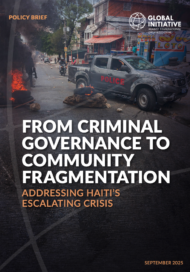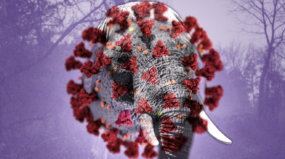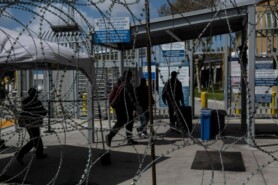By the end of August 2020, more than 25.5 million confirmed cases of COVID-19 had been registered, with more than 850 000 confirmed deaths documented worldwide. The United States, Brazil, Mexico and the United Kingdom remained among the worst-hit countries in the world in terms of total confirmed deaths, but in the week that former president Pranab Mukherjee passed away following a COVID-19 diagnosis a few weeks earlier, India registered the world’s highest single-day increase in cases of COVID-19, with a total of 78 761 new cases on the final Sunday in August. Indeed, by 6 September, India had overtaken Brazil in terms of confirmed COVID-19 cases, moving into second place globally. Despite seemingly having had the virus somewhat under control, a number of European countries, including Spain, France, Germany and the UK, began to witness a surge in new cases.
Against the backdrop of the pandemic, the US has also witnessed widespread protests against police brutality (prompted by the killing of George Floyd in late May), driven by Black Lives Matter, a grassroots movement advocating racial equality. But the US is not the only country where citizens are battling against violence at the hands of law-enforcement agencies – in many states across the world, governments are using the pandemic as a cover for increased disproportionate use of force, repression and censorship.
This month’s #CovidCrimeWatch newsletter focuses on the continued (and in some cases increasing) use of government violence against civilians and the increasing tendency of authoritarian regimes to silence opposition. Alongside August’s newsletter, the GI-TOC has published a policy brief, ‘Reforming the Response Paradigm,’ on the Black Lives Matter movement, as well as a blog on violence in Brazil. There is also a special edition of the GI-TOC’s podcast series, ‘The Impact: Coronavirus and Organized Crime,’ focusing on how COVID-19 has impacted and shaped security and organized crime in Brazil.
Finally, the GI-TOC has also published a blog exploring the impact of the pandemic on market for counterfeit goods and the ways in which new technologies can safeguard supply chains in the long term.
Police crack down
In our eleventh #CovidCrimeWatch newsletter, we reported on the numerous instances of violence perpetrated by law-enforcement agencies in Uganda, Nigeria, Honduras and France under the guise of enforcing coronavirus-related restrictions. Fast-forward three months and there is little sign that police violence has subsided. On 21 August, Kenyan police launched tear gas at demonstrators who were protesting government corruption in the procurement of COVID-19 medical equipment. However, police officers in the East African state have not limited themselves to tear gas; at least 17 people have been killed by police while enforcing the country’s pandemic-related regulations, according to Missing Voices KE, including 13-year-old Yasin Moyo, who was shot by police in March 2020 as he stood on a balcony.
In India, police enforcement of lockdown measures has also resulted in deaths, such as the case of a father and son who were beaten and killed while in police custody. The father had been arrested in June 2020 for having kept his phone shop open after curfew. Police brutality has been a regular occurrence in India throughout the pandemic, with reports of violence – including the use of lathis (a type of baton) – emerging as early as March. In response to a petition over the issue of police violence, the chief justice of Bombay High Court defended police violence, arguing that ‘police brutality is only one side of the coin’ and that there are many ‘black sheep everywhere’ who are failing to comply with coronavirus regulations.
As explored in the GI-TOC’s special podcast episode, police violence in Brazil is nothing new, especially in Rio de Janeiro’s favelas. The pandemic appears to have done nothing to stem the brutality. Against a backdrop of falling crime rates in Brazil during the pandemic, police killings in the first four months of 2020 increased in the states of Rio de Janeiro and São Paolo (by no less than 30% in the latter compared to the same period the previous year). However, following the killing of 14-year-old João Pedro Mattos Pinto in a Rio favela by police on 18 May, Brazil’s Supreme Court took the decision to ban police raids in the favelas during the coronavirus pandemic, a measure that was upheld by the Federal Supreme Court at the beginning of August. Since the ban was imposed, police raids (and by extension police killings) have declined dramatically.
States aim to silence
While the global increase in state targeting of civilians during lockdown is undoubtedly a concerning development, the increased authoritarian tendencies of governments around the world is perhaps just as worrying. Journalists and activists have borne the brunt of state repression, with a number of members of the press and civil-society organizations having been arrested (and in many cases convicted) on trumped-up charges.
Since February 2019, millions of Algerians have taken to the streets every week to protest against the political system, in what is known as the ‘Hirak’ movement. The grassroots uprising, nicknamed the ‘revolution of smiles’ thanks to its overwhelmingly peaceful nature, was initially remarkably successful, forcing the resignation of long-time authoritarian president Abdelaziz Bouteflika. However, the outbreak of the coronavirus in March 2020 brought the protests to an abrupt halt. Since then, the new government of Abdelmadjid Tebboune has exploited the global emergency to step up its repression of popular dissent, with several journalists and activists convicted under new laws introduced in April that criminalize the spread of purported ‘false news’. One of the most prominent cases – which has garnered worldwide attention – is the arrest of journalist Khaled Drareni, who was handed a three-year prison sentence in August for ‘inciting an unarmed gathering’ and ‘endangering national unity’.
On the other side of the African continent, investigative journalist Hopewell Chin’ono and activist and opposition politician Jacob Ngarivhume were arrested in Harare in July, accused of inciting violence by organizing an anti-corruption protest in the Zimbabwean capital, planned for 31 July. (The protest was foiled by the country’s military and police force.) Chin’ono, who is thought to have recently contracted COVID-19, had carried out an investigation exposing government corruption over the US$60 million purchase of protective equipment, which led to the sacking of the government’s health minister (who was subsequently charged with corruption). Both Chin’ono and Ngarivhume were released on bail at the beginning of September after spending six weeks in pre-trial detention.
The introduction of new legislation criminalizing the spread of fake news amid the pandemic has been replicated in a number of countries around the world. In South East Asia, there has been a growing trend since the beginning of the outbreak of governments using the health crisis to clamp down on free speech and press freedom. In March, the Thai government introduced a raft of new regulations aimed at combating the pandemic, including a provision that prohibits the sharing of news that is ‘false or may instigate fear among the people,’ and a ban on public gatherings, which has been used to initiate criminal proceedings against at least 25 individuals for participating in protests.
In the Philippines, a new anti-terrorism law passed in June under the guise of national security amid the pandemic is a severe threat to press freedom. Given the history of politically motivated convictions of journalists – such as that of journalist Maria Ressa (arrested in February 2019 for ‘cyber libel’) – it is not unreasonable to assume that such arrests will only increase in the wake of the new legislation. Similar laws have been used to arrest critics in Indonesia and in Vietnam, while in Cambodia, more than 40 people had been arrested as of April for incitement to cause chaos and spreading coronavirus-related fake news.
Legitimacy, impunity and scrunity
The links between police violence, creeping authoritarianism and criminality are complex, but understanding them is crucial for the fight against organized crime. At the most basic level, the first issue is simply that of resource allocation. If law-enforcement bodies are focused on policing national lockdowns, they may risk neglecting criminal groups operating in the shadows. Throughout our #CovidCrimeWatch series, we have continually documented the ways in which organized-crime actors have exploited the pandemic and its associated restrictions to strengthen their grip on illicit economies, and a distracted police force will only make their job easier.
But what of the impact of increasing police violence against civilians? From the very beginning of the pandemic, criminal groups have been positioning themselves as providers of public services and enforcers of the law. One of the fundamental tenets of criminal governance is the challenge to the traditional notion of the state’s monopoly on violence. When violence against civilians is instead practised by law-enforcement bodies, criminal groups are increasingly able to portray themselves as ‘protectors’ of the communities they seek to control, thus increasing their legitimacy in the eyes of citizens. And this increase in legitimacy can only ever come at the expense of the state, with far-reaching consequences for the state’s ability to effectively target and respond to organized crime.
Finally, the increasing censorship of journalists and repression of activists witnessed over the past months have grim ramifications for the ability of civil society to act as a check on government power and abuse thereof. As argued in the GI-TOC’s latest policy brief, ‘illicit markets thrive in silence and in an environment of intimidation’. In this regard, journalists and other civil-society actors are critical in the fight against organized-crime activity, perpetrated by non-state and state actors alike. So, when governments and police seek to clamp down on press freedom, what they are really doing is undermining the role of civilian oversight of criminal behaviour. Which in many cases was the objective all along.
***
The #CovidCrimeWatch archive of news articles from around the world relating to organized crime and the COVID-19 pandemic has been updated. Please click below to download the repository, which now hosts 635 articles.
#CovidCrimeWatch is curated by Lyes Tagziria.
READ MORE:
How to Run a Criminal Network in a Pandemic
Criminal Governance Under Coronavirus: How Colombian Groups Seized the Day
Cops Are Seizing Massive Amounts of Cocaine in Honduras During COVID-19
Restrictions to a New Kind of Drug Smuggling Are Harming Mexico’s Opioid Users
Hasta finales de agosto de 2020, se tienen registrados mas de 25.5 millones de casos confirmados de COVID-19 y más de 850 000 muertes documentadas en todo el mundo. Estados Unidos, Brasil, México y el Reino Unido se mantienen entre los países más golpeados en términos de muertes totales confirmadas, pero durante la semana en que falleció el presidente Pranab Mukherjee, después de un diagnóstico positivo unas semanas antes, India registró el más alto incremento de casos de COVID-19 reportados en un solo día, con un total de 78 761 nuevos casos el último domingo de agosto. De hecho, para el 6 de septiembre, India había sobrepasado a Brasil en cuanto a casos confirmados, y se colocaba en el segundo lugar global. Por otra parte, a pesar de haber tenido el virus aparentemente bajo control, un número de países europeos, entre ellos España, Francia, Alemania y el Reino Unido, empiezan a notar un resurgimiento en los casos.
En el contexto la pandemia, Estados Unidos también ha sido testigo de un creciente número de protestas en contra de la brutalidad policiaca (provocadas por el asesinato de George Floyd a finales de mayo), encabezadas por Black Lives Matter, un movimiento de base que promueve la igualdad racial. Pero Estados Unidos no es el único país donde los ciudadanos luchan contra la violencia ejercida por las agencias de seguridad, en muchos gobiernos alrededor del mundo, el estado utiliza la pandemia como excusa para el incremento en el uso desproporcionado de la fuerza, la represión y la censura.
Este mes, #CovidCrimeWatch se enfoca en el uso continuo (y en muchos casos creciente) de la violencia ejercida por el estado en contra de la población civil, así como en la tendencia de los regímenes autoritarios por silenciar a la oposición. Junto al newsletter de agosto, GI-TOC publicó el documento de política pública sobre el movimiento Black Lives Matter, ‘Reforming the Response Paradigm,’ (Reformar el paradigma de respuesta), así como un blog sobre la violencia en Brasil. También contamos con una edición especial de la serie de podcast de GI-TOC ‘The Impact: Coronavirus and Organized Crime’, (El impacto: coronavirus y crimen organizado), que se enfoca en como los efectos del COVID-19 han moldeado la seguridad y el crimen organizado en Brasil.
Por último, GI-TOC ha publicado un blog que explora los efectos de la pandemia en el mercado de bienes falsificados y la forma en que las nuevas tecnologías pueden garantizar las cadenas de suministro a largo plazo.
Represión policiaca
En la edición número once del #CovidCrimeWatch newsletter, reportamos las diferentes instancias en que la violencia perpetrada por la policía en Uganda, Nigeria, Honduras y Francia, se disfraza bajo la aplicación de restricciones contra el coronavirus. Tres meses más tarde, no hay señal de que la violencia policiaca disminuya. El 21 de agosto, la policía de Kenya lanzó gases lacrimógenos a manifestantes que protestaban la corrupción del gobierno alrededor del reparto de equipo médico para combatir el COVID-19. Sin embargo, policías del estado al este de África, no se limitan al gas lacrimógeno; de acuerdo a Missing Voices KE, al menos 17 personas han muerto a manos de la policía en la implementación de regulaciones relacionadas a la pandemia, incluido Yasin Moyo de 13 años, que recibió un disparo de la policía mientras estaba parado en un balcón.
En India, la aplicación de las medidas de confinamiento también ha provocado muertes, como el caso de un padre y su hijo que fueron golpeados hasta morir mientras eran custodiados por la policía. El padre había sido arrestado en junio de este año por haber dejado su tienda abierta pasado el toque de queda. La brutalidad policiaca ha sido algo común en India a lo largo de la pandemia, con reportes de violencia que incluyen el uso de lathis (una especie de bastón), registrados incluso desde inicios de marzo. En respuesta a una petición sobre el uso de la violencia policiaca, el jefe de Justicia de la Corte Suprema de Bombay, la defendió bajo el argumento de que ‘la brutalidad policiaca es sólo un lado de la moneda’ y que hay ‘ovejas negras en todos lados’ que no están cumpliendo con las regulaciones impuestas por el coronavirus.
Como exploramos en el episodio especial del podcast de GI-TOC, la violencia policial en Brasil no es algo nuevo, especialmente en las favelas de Rio de Janeiro. La pandemia parece haber impactado poco en la contención de la brutalidad policiaca. En un contexto donde los índices de criminalidad están a la baja durante la pandemia, las muertes a manos de la policía aumentaron los primeros cuatro meses del 2020 en Río de Janeiro y Sao Paolo (en este último al menos un 30% comparado con el mismo periodo del año anterior). Sin embargo, tras el asesinato a manos de la policía de João Pedro Mattos Pinto de 14 años, en una favela de Río el 18 de mayo, la Corte Suprema de Brasil tomó la decisión de prohibir las redadas policiacas en las favelas durante la pandemia, una medida ratificada a principios de agosto por la Corte Suprema Federal. Desde que entró en vigor la prohibición, las redadas (y por ende los asesinatos a manos de la policía) han disminuido de forma dramática.
Estados que buscan el silencio
Si bien el aumento global de los ataques dirigidos a civiles por parte del estado durante el confinamiento es alarmante, las crecientes tendencias autoritarias de los gobiernos alrededor del mundo, es igual de preocupante. Periodistas y activistas han soportado lo peor de la represión oficial, con un gran número de miembros de la prensa y organizaciones de la sociedad civil, arrestados y en muchos casos condenados, bajo cargos falsos.
Desde febrero de 2019, millones de argelinos han tomado las calles cada semana en protesta contra el sistema político, en lo que se ha conocido como movimiento ‘Hirak’. El levantamiento de base, que fue bautizado como la ‘revolución de las sonrisas’ por su abrumadora naturaleza pacífica, fue muy exitoso al inicio y logró la dimisión del presidente autoritario Abdelaziz Bouteflika. Sin embargo, el brote de coronavirus en marzo de 2020, frenó de golpe las protestas. Desde entonces, el nuevo gobierno de Abdelmadjid Tebboune ha utilizado la emergencia global para aumentar la represión a la disidencia popular, con la condena de varios periodistas y activistas bajo nuevas leyes puestas en vigor en abril, que criminalizan la difusión de ‘supuestas noticias falsas’. Uno de los casos más notables, que ha generado atención internacional, es el arresto del periodista Khaled Drareni, que fue condenado a tres años de prisión en agosto por ‘promover una reunión desarmada’ y ‘poner en peligro la unidad nacional’.
Del otro lado del continente africano, el periodista de investigación Hopewell Chin’ono y el político de oposición y activista Jacob Ngarivhume, fueron arrestados en Harare en julio, acusados de incitar a la violencia al organizar una protesta anticorrupción planeada para el 31 de julio, en la capital de Zimbabue. La protesta fue frustrada por el ejército y la policía. Chin’ono, que se piensa ha contraído COVID-19 recientemente, ha llevado a cabo una investigación que expone la corrupción del gobierno en la compra de equipo de protección por $60 millones de dólares, lo que ocasionó el despido del ministro de salud, que después fue acusado por corrupción. Tanto Chin’ono como Ngarivhume fueron liberados bajo fianza a inicios de septiembre después de pasar seis semanas en detención preventiva.
La implementación de nuevas leyes que criminalizan la difusión de noticias falsas relacionadas a la pandemia, ha sido replicada en varios países alrededor del mundo. Desde el inicio del brote, existe una creciente tendencia entre los gobiernos del sudeste de Asia de utilizar la crisis sanitaria para restringir la libertad de prensa y la libre expresión. En marzo, el gobierno de Tailandia implementó una serie de nuevas regulaciones dirigidas al combate de la pandemia, con una disposición que prohíbe compartir noticias sean ‘falsas o que puedan provocar miedo entre la población’, así mismo, entró en vigor la prohibición de las reuniones públicas, disposición que ha sido utilizada para iniciar procesos criminales contra al menos 25 individuos por participar en protestas.
En Filipinas, una nueva ley antiterrorismo aprobada en junio bajo pretexto de seguridad nacional durante la pandemia, es una severa amenaza a la libertad de prensa. Dado el historial de periodistas condenados por motivos políticos, como el caso de la periodista Maria Ressa (arrestada en febrero de 2019 por ‘difamación electrónica’), no es raro asumir que este tipo de arrestos solo seguirá en aumento bajo la nueva legislación. Leyes similares se han utilizado para arrestar detractores en Indonesia y Vietnam; mientras en Camboya, más de 40 personas han sido arrestadas desde abril por incitación a causar desorden y difusión de noticias falsas relacionadas al coronavirus.
Legitimidad, impunidad y escrutinio
La relación entre la violencia policial, el autoritarismo progresivo y la criminalidad, es compleja, pero su comprensión es crucial en la lucha contra el crimen organizado. En el nivel más básico, el primer tema a resolver es la asignación de recursos. Si las agencias de seguridad se enfocan en mantener los confinamientos nacionales, corren el riesgo de descuidar a los grupos criminales que operan en la clandestinidad. A través de nuestra serie #CovidCrimeWatch, hemos documentado continuamente las formas en que los grupos criminales se han aprovechado de la pandemia y las restricciones relacionadas para fortalecer su control sobre las economías ilícitas, y una fuerza policial distraída, solo facilita su trabajo.
Pero ¿Qué sucede con el impacto de la creciente violencia policiaca sobre la población civil? Desde el inicio mismo de la pandemia, los grupos criminales se han posicionado como proveedores de servicios públicos y vigilantes del orden. Uno de los principios fundamentales de la gobernanza criminal, es el reto a la noción tradicional de que el estado tiene el monopolio de la violencia. Cuando la violencia en contra de la población civil es ejercida por los agentes policiales, los grupos criminales tienen más oportunidad de presentarse como protectores de las comunidades que buscan controlar, lo que aumenta su legitimidad ante los ojos de los ciudadanos. Este aumento de la legitimidad solo puede darse a costa del estado, con consecuencias de largo alcance en la habilidad del propio gobierno para atacar efectivamente y responder al crimen organizado.
Por último, la creciente censura a periodistas y represión de activistas que hemos presenciado en los últimos meses, tiene consecuencias terribles en la habilidad de la sociedad civil para frenar el poder del gobierno y el abuso del mismo. Como establece el último documento de política pública publicado por GI-TOC, ‘los mercados ilícitos prosperan en el silencio y en un ambiente de intimidación’. Al respecto, periodistas y otros actores de la sociedad civil son críticos en la lucha contra la actividad del crimen organizado perpetrada tanto por actores particulares como del estado. De esta forma, cuando los gobiernos y la policía buscan frenar la libertad de prensa, lo que en realidad están haciendo es socavar el rol de la supervisión civil del comportamiento criminal, qué en muchos casos, es el objetivo verdadero.
El archivo de #CovidCrimeWatch de noticias y artículos de todo el mundo relacionados al crimen organizado y el COVID-19, se ha actualizado. Descarga nuestro repositorio, que ahora cuenta con 635 artículos, en el siguiente enlace.



